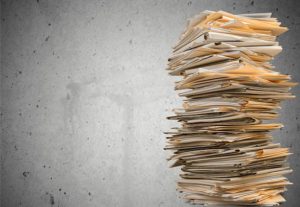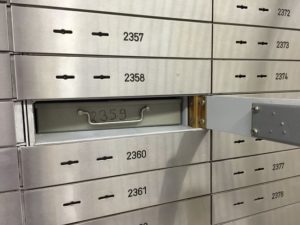 Most households accumulate papers and records that are important to them but many people do not know the best way to store them. There are two common types of household record storage: at home and a safe deposit box.
Most households accumulate papers and records that are important to them but many people do not know the best way to store them. There are two common types of household record storage: at home and a safe deposit box.
At Home
Most of your records will be kept at home. Paper documentation remains the comfortable choice for many people. If you store information electronically, it is important to ensure that your laptop or external hard drive is secure. The Federal Trade Commission has additional information on security.
Many people receive bank and billing statements via email. The email will provide a link to your password protected online account. If you chose to go paperless in this way, be certain you download the documents to your computer or to a flash drive so you have a copy of them.
Information may also be stored “in the Cloud” but you need to be sure that it is secure and that your personal information will be safe. If you are at all uncertain, you should research your options and read several trusted review sources regarding various online storage devices and services. Here’s a link to 10 Top Ten Reviews to get you started.
Types of Financial Records stored at Home or Electronically Include:
Current Financial Records
These are updated regularly, often monthly and include bank statements, bills and record of payments, receipts, and records of doctor/dental visits as well as pet care.
Having an active and readily available file folder to store incoming tax return documentation is another valuable current financial record. It will be helpful when it is time to prepare your tax return.
Permanent Files
If convenient filing space is limited, move the less used files to a more permanent spot. Active files (those used at least once a year) should be kept handy, but inactive files containing permanent or long-term items can be stored in a dry, out-of-the-way place in the home.
To keep your current financial files updated, it is best to clean them out each year. Be sure to shred any hard copy documents with sensitive and personal information when the documents are no longer needed. Examples of ‘sensitive information’ are your social security number, account numbers, tax and income information.
A safe deposit box within the vault of a local bank is a secure place to store anything valuable, but is rarely needed on short notice. You will pay an annual rental fee for a safe deposit box. Although the items you store there are not insured, they are less likely to be lost due to theft, fire, flood, or storm than if they are stored in your home. So as a general rule, a safe deposit box is a great place to store any record that is difficult, costly, or impossible to replace. For convenient reference, keep a list of what you have stored in your safe deposit box in a home file.


